What is Dementia Care?
From the early signs to diagnosis and beyond, here’s what you need to know about living life to the full with dementia.
Scroll to Explore
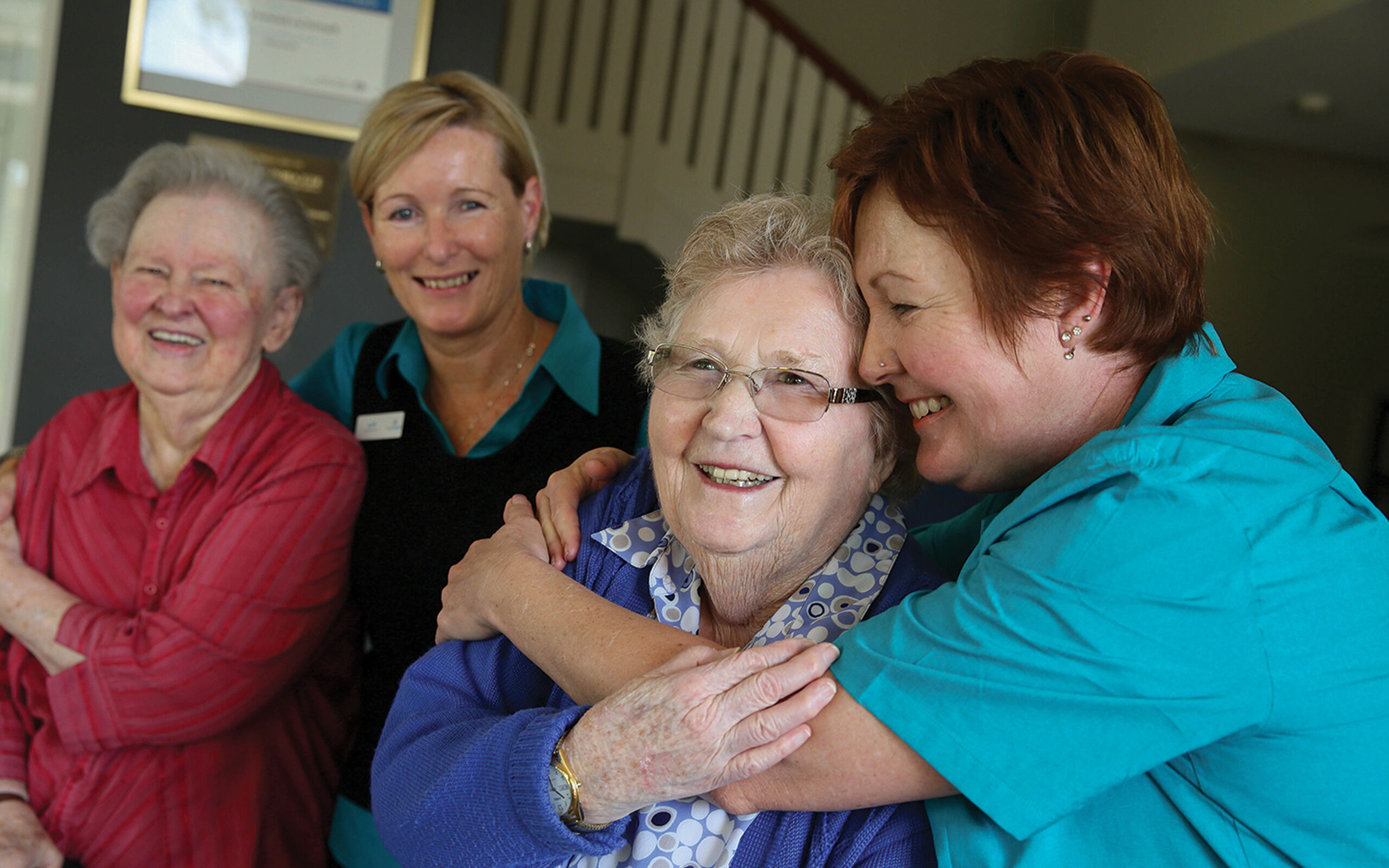
13 January 2023
Stories
| Aged Care Homes
What is Dementia Care?
Receiving a diagnosis of dementia can be a daunting prospect, but the good news is that with a comprehensive care plan, the condition can be made easier to live with.
Jump to:
- What is dementia?
- Signs and symptoms to look out for
- Receiving a dementia diagnosis
- Help and support after diagnosis
- How do I find dementia care?
- Dementia support resources
What is dementia?
A common misconception about dementia is that it is one, standalone condition. In fact, the term ‘dementia,’ describes a collection of symptoms and changed behaviours that are caused by disorders affecting the brain.
Many people are surprised to learn that there are over 100 conditions that may cause someone to experience dementia. The most common types of dementia include Alzheimer’s disease, vascular dementia and dementia with Lewy bodies.
And whilst dementia is more common in the elderly; it is not considered a normal aspect of ageing. In a healthy ageing process, a person usually retains knowledge, language, experiences, and abilities, whereas people with dementia may struggle to do so, and typically, their symptoms become more severe over time.

Dementia signs and symptoms to look out for
The symptoms of dementia can vary widely from person to person. They are also inconsistent – people living with dementia have good days and bad days. But if you’ve noticed changes in behaviour that are affecting day to day life, then it’s worth checking in with your GP.
The key signs to look out for are:
- A loss of short-term memory, reduced attention span, reasoning and problem-solving
- Reduced balance and visual perception
- Trouble speaking and communicating thoughts
- Difficulty with reading and writing
- Unusual behaviour that is out of character, including acting impulsively
- Empathy or consideration of others’ feelings may appear reduced.
- Confusion about where they are and getting lost in places in which they are usually familiar
- Confusion about the time of day
- Using unusual words to describe commonplace things.
It’s important to note that many treatable conditions are easily mistaken for symptoms of dementia. Common occurrences such as infections, constipation, changes in medication, hearing and vision loss can also cause confusion and memory loss in older people. These symptoms can often be easily reversed with appropriate treatment by a medical practitioner.
Receiving a dementia diagnosis
Receiving a diagnosis of dementia can be a daunting prospect, for both the person themself and their family. You might be wondering about the impact of caring for someone with dementia, and what will happen next.
It’s important to note that dementia affects each person differently, and there are medications available that can help to maintain cognitive function for as long as possible. Your GP will be able to assist you with a plan, which can be updated as the condition progresses.
The diagnostic process for different types of dementia varies, but it often includes the following
- full medical assessment
- full medical history
- blood tests
- neurological examinations
- neuropsychological tests
- brain imaging
Dementia help and support
If you or someone you love has recently received a dementia diagnosis, you are certainly not alone. In 2022, there were an estimated 487,500 Australians living with dementia2. The good news is that there are many different support services in place to help you and your family continue living as normally as possible.
Symptoms for dementia gradually worsen over time and whilst there is no known cure, a comprehensive care plan which includes dementia specific therapies, medications, and ongoing support can make the condition much easier to live with.
Other supportive care options include BaptistCare in home care to help you remain in the comfort of your own home for longer, and dementia-specific aged care homes where staff who are experts in dementia care can offer clinically proven, ongoing support. Among those living with dementia in Australia, 1 in 3 people choose to live in residential aged care, sometimes referred to as a nursing home.
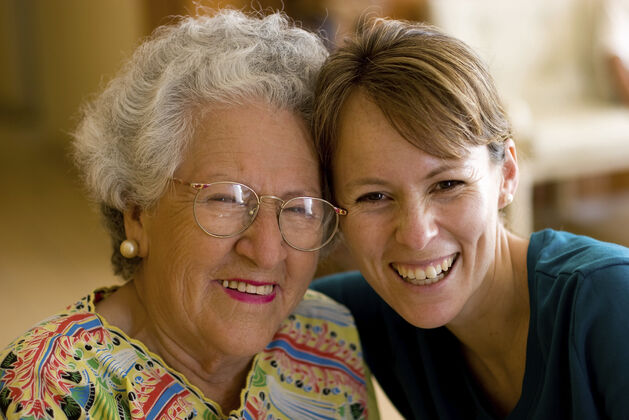
How can BaptistCare help?
At BaptistCare, we greatly value the relationships we build with residents and their families. We work together using our unique MyTeam relational model of care, to support the person to continue living their life their way.
BaptistCare residents may choose from a wide range of engaging leisure activities, adapted to the changing needs and preferences of each resident. The program is designed to:
- Enable active minds, bodies and senses;
- Build and maintain connections within our communities – culturally, socially, and spiritually;
- Offer fun, a sense of purpose, and celebration;
- Reduce agitation and improve communication.
Secure care
People living with dementia can occasionally get lost in their own communities, confused about where they are. This can understandably cause a lot of worry and anxiety for their safety, particularly for family members.
Our dementia-care specific aged care homes can offer a safe, secure, and comfortable space for residents, offering peace of mind for them and their families.
Most of our BaptistCare homes can accommodate up to 18 residents living with dementia, and feature spacious, comfortable rooms – all with private ensuites. Our homes have pleasant, light-filled indoor and outdoor communal areas, where residents can enjoy a morning or afternoon stroll, spend time with their friends and family, and enjoy a sense of independence within a safe and secure space.
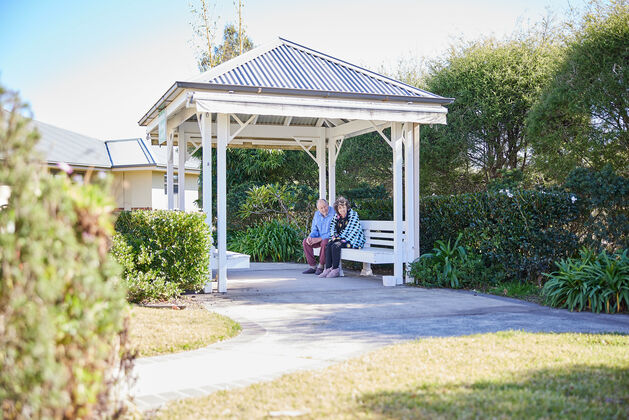
Supportive Environments
In the same way that a ramp can support a person with mobility challenges, a carefully thought-out living space can be very helpful for people living with dementia. Their sense of independence can be enhanced through wayfinding and orientation cues, landmarks, and features.
At BaptistCare, we make sure our dementia-specific residential aged care homes incorporate this approach. We include identifiable cues such as personalised display cases outside bedrooms to help residents recognise their personal space, and also to help others engage with the resident about what’s important to them.
At times, people living with dementia may experience distressing behavioural and psychological symptoms. Our BaptistCare teams are experienced in dealing with these. We are committed to providing caring, nurturing, and tailored support to meet the person’s individual needs, and with minimal use of restrictive practices.
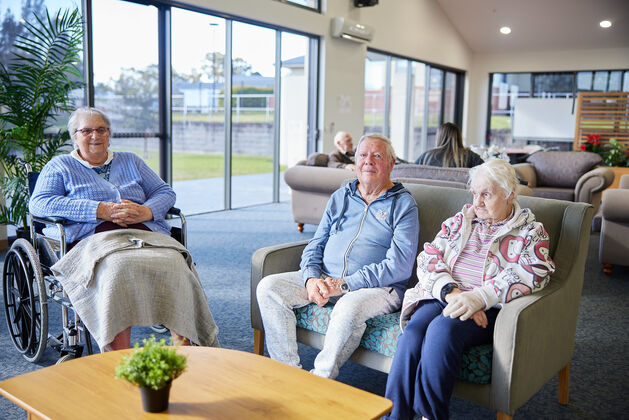
MyTeam® Care Approach
Our MyTeam® care approach is a personalised and effective way of giving care that delivers support and comfort to our BaptistCare residents and their families.
The approach means that each resident has a consistent, familiar team of people they know, who understand their unique background and preferences. Care teams work closely with families to get to know each resident personally and form a consistent unit of care.
MyTeam® care means that residents will see the same staff members every time they are rostered. The consistency of this routine allows for a quicker and deeper understanding of any behaviour changes, or deterioration in health.
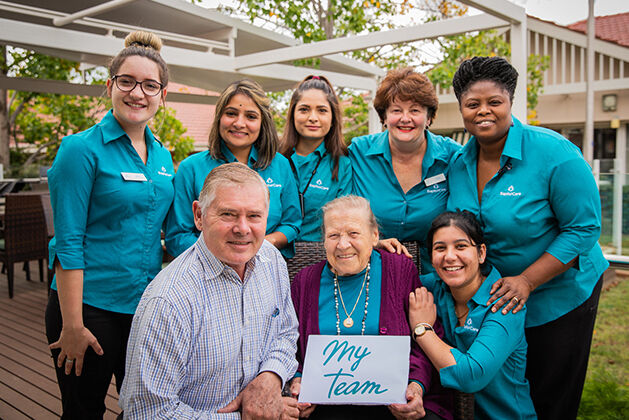
How do I find dementia care near me?
You can search BaptistCare aged care homes using our handy online search tool here: https://baptistcare.org.au/locations/aged-care-home-locations;You can also explore more about our dementia care services, including real life stories from residents and their loved ones here: https://baptistcare.org.au/dementia-care
Dementia support resources
Sources:
1. Australian Bureau of Statistics (2020) Causes of Death, Australia, 2019 (cat. No. 3303.0).
2. Australian Institute of Health and Welfare, Dementia Snapshot, July 2020.
3. Royal Commission into Aged Care Quality and Safety, Research Paper 8 - International and National Quality and Safety Indicators for Aged Care, 2020, p161.
Make an Enquiry
Want to speak to someone about what might work best for you? Complete the enquiry form below and one of our friendly team will be in touch.